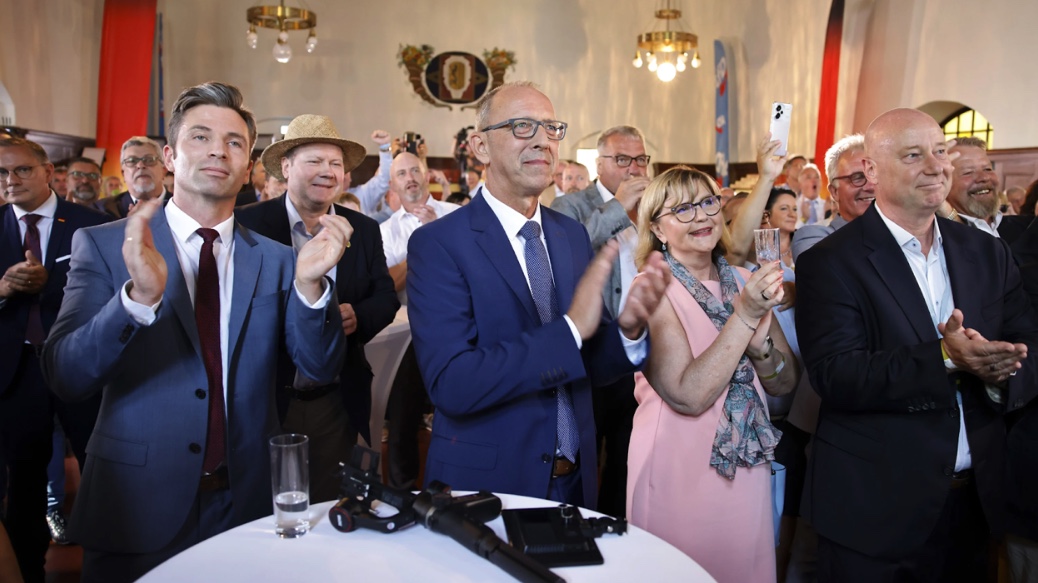การสำรวจความคิดเห็นก่อนการเลือกตั้งแสดงให้เห็นว่า พรรคขวาจัดอย่าง AfD ของเยอรมนีมีแนวโน้มที่จะชนะในการเลือกตั้งท้องถิ่นครั้งแรกหลังก่อตั้งมาตั้งแต่ปี 1945
โดยคาดว่า AfD จะได้รับคะแนนเสียง 33.5% ของรัฐเธอริงเกีย ซึ่งนำหน้าพรรคอนุรักษ์นิยม Christian Democrats (CDU) ที่ได้รับคะแนนเสียง 24.5% ขณะที่ในรัฐแซกโซนี ผลสำรวจแสดงให้เห็นว่าทั้งสองพรรคมีคะแนนใกล้เคียงกัน
ทางพรรคฝ่ายซ้ายน้องใหม่ที่เพิ่งก่อตั้ง Sarah Wagenknecht Alliance หรือ BSW มีแนวโน้มว่าจะได้อันดับที่สามในทั้งสองรัฐ โดยมีคะแนนจากผู้มีสิทธิ์เลือกตั้งประมาณ 1.7 ล้านคนในเธอริงเกีย และ 3.3 ล้านคนในแซกโซนี
ส่วนพรรคสังคมนิยมประชาธิปไตย (Social Democratic Party) หรือ SPD ของนายกรัฐมนตรีเยอรมนี โอลาฟ โชลซ์ คาดว่าจะได้ผลลัพธ์ที่น่าผิดหวังในทั้งสองรัฐ
ผลการเลือกตั้งในเธอริงเกียและแซกโซนีถือเป็นบททดสอบสำคัญสำหรับโชลซ์และพรรคพันธมิตรของเขา ก่อนการเลือกตั้งทั่วไปในปีหน้า ทางด้านพรรค AfD เลือกชูนโยบายการอพยพเป็นหลัก แต่รัฐบาลของโชลซ์กลับเผชิญกับความขัดแย้งภายในพรรคและข้อกล่าวหาว่าผู้แทนที่ได้รับการเลือกตั้งทำหน้าที่เป็นกระบอกเสียงแทนประชาชนได้ไม่ดีพอ อีกทั้งยังไม่แสดงถึงค่านิยมที่พวกเขาเคยยืนหยัด สำหรับพรรค AfD การก่อตั้งรัฐบาลท้องถิ่นนั้นมีความเป็นไปได้น้อย เนื่องจากพวกเขามักพบปัญหาในการหาพรรคพันธมิตร บ้างก็เป็นที่กล่าวขานว่าพรรค AfD มีแนวคิดขวาจัดสุดโต่งเนื่องจากผู้สมัคร Björn Höcke ถูกฟ้องถึงสองครั้งในข้อหาส่งต่อความเฃื่อของนาซี
การเลือกตั้งระดับภูมิภาคในเยอรมนีจัดขึ้นทุกห้าปีและแต่ละรัฐอาจกำหนดวันเลือกตั้งที่แตกต่างกัน ส่วนรัฐแบรนเดนบูร์กของเยอรมนีได้กำหนดให้มีการลงคะแนนเลือกตั้งในวันที่ 22 กันยายนนี้
Germany’s far-right party AfD set to win one state election, and is level in another, exit polls show

For the first time since 1945 a German far-right party is projected to win in regional elections, exit polls show.
Founded in 2013, Alternative for Germany (AfD) – is on track to claim victory in state parliamentary elections in the country’s eastern region of Thuringia, initial exit polls by German state broadcaster ZDF show.
AfD is projected to get 33.5% of the vote, well ahead of the conservative party Christian Democrats (CDU) with 24.5%, according to ZDF.
In Saxony, which also held a regional election Sunday, the two parties are neck and neck, according to state broadcaster ZDF.
Newly founded left-wing party, the Sarah Wagenknecht alliance – or BSW – looks to be coming in third in both Thuringia and Saxony, where roughly 1.7 million people and 3.3 million were eligible to vote, respectively.
German Chancellor Olaf Scholz’s Social Democratic Party (SPD) is projected to get disappointing results in both states.
The local elections results in Thuringia and Saxony are seen by many as a litmus test for Scholz and his coalition partners ahead of next year’s general elections. While the AfD has put immigration front and center of its agenda, the coalition built by Scholz is creaking, with infighting, disagreements about policy and accusations that elected officials no longer represent the values they were initially elected for.
AfD co-chair Alice Weisel called the results in Thuringia a “historic success,” reflecting the people’s “rejection” of Scholz’s coalition government.
AfD would very unlikely be able to form a regional government, struggling to find allies in other parties. Branches of the AfD are classified as suspected right-wing extremist by Germany’s intelligence agency and the party’s top candidate in Thuringia, Björn Höcke has been fined twice for using a Nazi slogan.
Regional elections take place every five years in Germany and each state can have their election at various dates. The German state of Brandenburg is set to head to the polls on September 22.
By Nadine Schmidt, Claudia Otto and Matthies Otto, CNN (September 1, 2024)

















